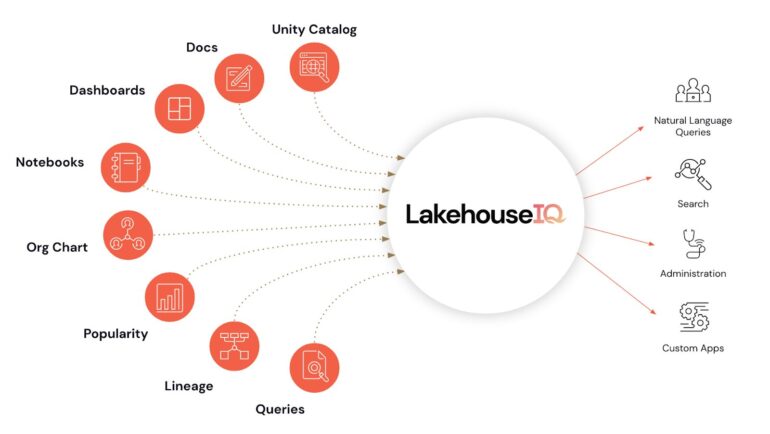TL;DR:
- Databricks introduces LakehouseIQ, a knowledge engine that enables natural language interaction with data analytics.
- Delta Lake 3.0 brings Universal Format (UniForm), ensuring seamless compatibility with Apache Iceberg and Apache Hudi.
- Lakehouse AI tools empower customers to develop generative AI applications within the Databricks Lakehouse Platform.
- Lakehouse Federation capabilities in Unity Catalog establish a unified data access and governance framework.
- These advancements redefine the market, democratizing data analytics and driving efficient AI development.
Main AI News:
Databricks, a pioneering Data and AI company, showcased its latest cutting-edge advancements to a captivated audience at the highly anticipated Data + AI Summit. These remarkable innovations exemplify Databricks’ unwavering dedication to pushing the boundaries and setting unprecedented benchmarks in the realm of data and AI.
One of the groundbreaking announcements is the introduction of LakehouseIQ, a revolutionary knowledge engine that revolutionizes data analytics accessibility for all. LakehouseIQ is a powerful generative AI-driven interface that comprehends an organization’s distinct data, culture, and operational nuances. Leveraging its sophisticated capabilities, LakehouseIQ adeptly grasps intricate jargon, data usage patterns, and organizational structure, enabling users to pose queries within a comprehensive business context. This breakthrough technology allows anyone within an organization to effortlessly interact with LakehouseIQ using natural language, seamlessly searching, understanding, and retrieving valuable data insights. Crucially, LakehouseIQ seamlessly integrates with the Databricks Unity Catalog, ensuring that democratizing data access remains in full compliance with internal security and governance protocols.
In yet another significant development, Databricks proudly announces Delta Lake 3.0, a pioneering universal format that delivers unparalleled compatibility with Apache Iceberg and Apache Hudi. As a prominent contributor to the esteemed Linux Foundation’s open-source initiative, Databricks spearheads innovation with the Delta Lake project. The forthcoming release of Delta Lake 3.0 introduces the Universal Format (UniForm), a groundbreaking feature that empowers users to read data stored in Delta as if it were in the format of Apache Iceberg or Apache Hudi. By removing the complexities associated with selecting open data formats and eliminating compatibility challenges, UniForm enables users to seamlessly embrace Iceberg and Hudi functionalities within Delta Lake. With Delta Lake 3.0, users can bid farewell to convoluted integration efforts caused by disparate data formats, empowering them to focus on constructing highly performant, open lakehouses.
Moreover, Databricks unveils an array of remarkable Lakehouse AI tools, reaffirming its commitment to fostering innovation and efficiency for customers. These cutting-edge generative AI advancements enable customers to effortlessly develop large language models (LLMs) and other AI applications directly within the Databricks Lakehouse Platform. Lakehouse AI leverages a unique data-centric approach to AI, offering integrated capabilities that span the entire AI lifecycle, including robust monitoring and governance. The introduction of groundbreaking features, such as Vector Search, a curated collection of open source models, LLM-optimized Model Serving, and MLflow 2.5 with LLM capabilities like AI Gateway and Prompt Tools, empowers customers to seamlessly implement generative AI use cases. Additionally, Lakehouse Monitoring ensures a comprehensive view of AI workflows and performance, enabling users to optimize their AI initiatives effectively.
Lastly, Databricks announces the integration of Lakehouse Federation capabilities into the Unity Catalog, ushering in a new era of unified data access and governance. With this transformative feature, organizations can establish highly scalable, efficient data mesh architectures while maintaining consolidated governance. The introduction of Lakehouse Federation capabilities allows users to seamlessly discover, query, and govern data across multiple platforms within the Databricks Lakehouse Platform, eliminating the need for cumbersome data movement or replication. As a result, data silos become a thing of the past, empowering customers to unlock the full analytical potential of their unified lakehouse.
Conclusion:
Databricks’ latest breakthrough offerings have far-reaching implications for the market. The introduction of LakehouseIQ redefines data analytics accessibility, enabling users to interact with data using natural language. Delta Lake 3.0’s Universal Format eliminates compatibility challenges, simplifying data integration and enabling the construction of high-performance lakehouses. The Lakehouse AI tools empower customers to efficiently develop generative AI applications within the Databricks platform, leveraging its comprehensive capabilities. Lastly, the Lakehouse Federation capabilities consolidate data access and governance, transforming the market by unifying previously siloed data systems. With these advancements, Databricks solidifies its position as an industry leader, democratizing data analytics and driving efficient AI development for organizations across various sectors.

